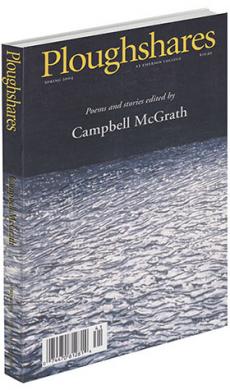Introduction
The vigor and accomplishment of contemporary American literature is nowhere more easily appreciated than in the journals and quarterlies that labor doggedly, and for the most part thanklessly, to display both the quantity and quality of the enterprise. The quantity and quality of those journals and quarterlies themselves is both staggering and delightful, and the best of them—for my money Ploughshares would stand at the top of any such list—should be counted among our most valuable literary treasures. Reading Ploughshares, one is in touch with the evolving edge of America’s cultural consciousness in a remarkable way; what other art form showcases the breadth of its current work in such a direct and immediate manner?
Editorially, what I experienced over these last months was something like the engagement with the zeitgeist that is one of parenthood’s most famous fringe benefits: it may not keep you young, but it keeps you in touch with what the young are into, from Sponge Bob to post-Oulipo poetics (or is that redundant?). Assuming the mantle of parenthood, however, is a bit vainglorious for a guest editor; stepbrother might be a better analogy, or favorite uncle, since the role is mostly fun and games, while the real work is left to others. "Others" here means both Ploughshares‘s remarkable editorial staff, and its actual, biological parents, the writers, whose creativity finds its happy announcement herein. If there is, as advertised, a "governing aesthetic" behind the tradition of excellence at this magazine, it originates with Don Lee and David Daniel, who have been beating swords into ploughshares long enough to remain unfazed by the eccentricities of their surrogates.
These pages contain only a fraction of all the work I read and admired; it was a luxurious pleasure to be inundated by the great material sent my way, but it was a flood beyond my ability to fully accommodate or accurately acknowledge. In the end, one picks and chooses, and despite my efforts at eclecticism and diversity, this issue no doubt reflects my entirely subjective tastes. Certainly it favors writing whose primary engagement is with language rather than with form, whether traditional or experimental; it accords as much respect to comedy as to tragedy; it gives the benefit of the doubt to younger, unpublished, or new (at least to me) writers; and it preserves a vision of literature as an ingenious human invention among whose many functions fostering delight remains not only viable but essential.
The purpose of my avuncular, editorial energies resides, finally, within these poems and stories, which require no further introduction. Home from the playground, having done my happy duty, I hasten to hand them back to their progenitors. May they, and the readers of Ploughshares, delight alike in the marvels of their creations.
